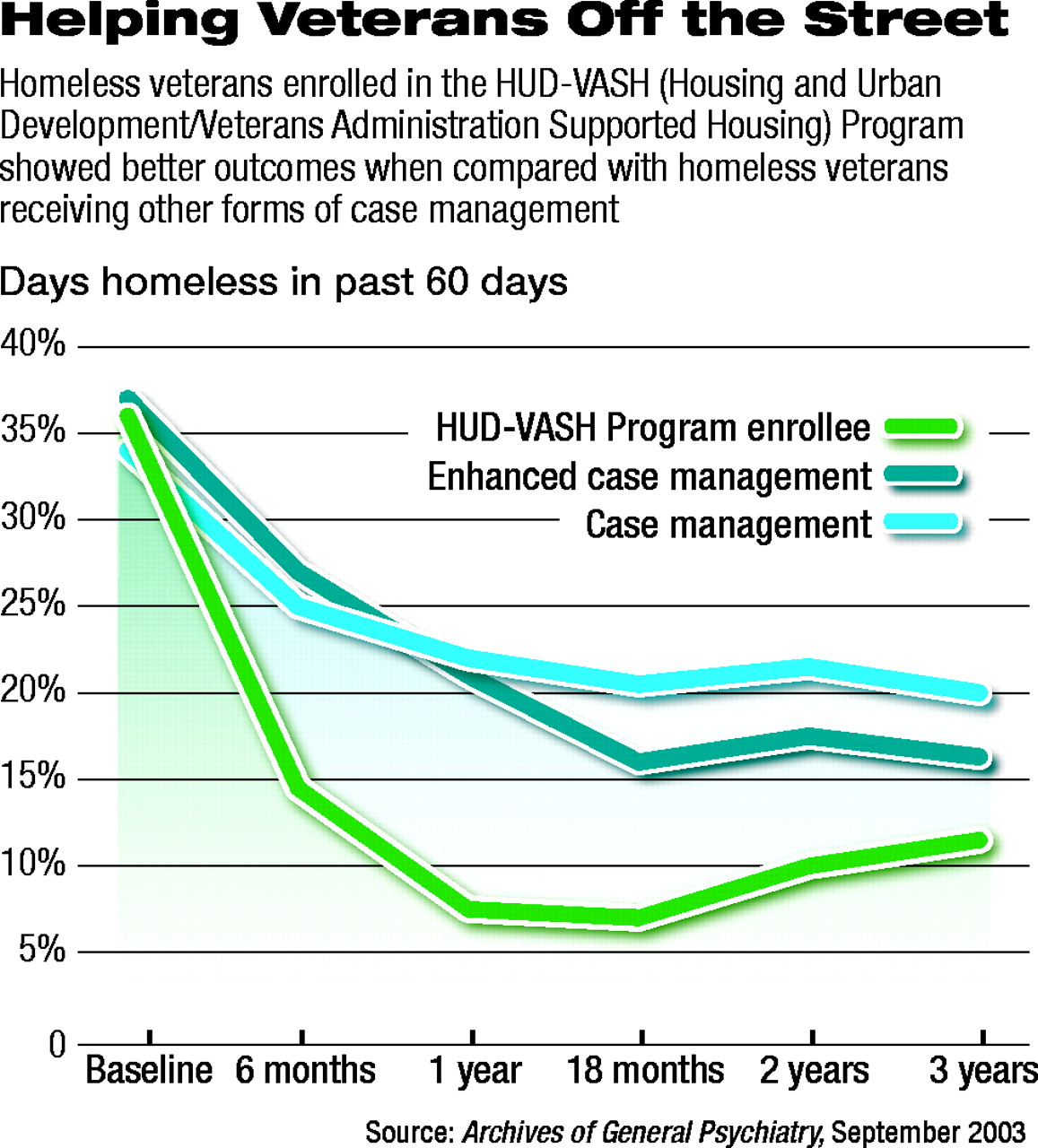Many people would view the impetus for programs serving homeless veterans merely as a lucky break.
In 1987 a Republican staff member of the Senate Veterans Affairs Committee who was about to lose her job inserted the word “homeless” into a bill that appeared targeted for defeat.
However, Sen. Frank Murkowski (R-Alaska) inserted the legislation into a comprehensive bill that addressed problems related to health care services for veterans.
The immediate result was a pilot program, housed in what was then the Veterans Administration (VA), specifically targeted at homeless veterans with serious mental illness or substance abuse problems.
Paul Errera, M.D., however, prefers to look at this apparent stroke of serendipity as a “happening,” a term that he borrowed from political scientist Charles Lindblom and captures the importance both of opportunity and of one's ability to exploit it.
Errera, in 1985, had moved to Washington, D.C., from his position as chief of psychiatry at VA Medical Center (VAMC) at West Haven, Conn., to direct the mental health component of the VA's health care system, because he was concerned about the erosion of funding for psychiatry in the VA.
He also was committed to community-based treatment for people with serious mental illness, and the new program offered opportunities to advance that goal.
The Homeless Chronically Mentally Ill (HCMI) program, later renamed Health Care for Homeless Veterans (HCHV), provides outreach to homeless veterans living on the streets and in shelters with serious mental illness or substance abuse problems and connects them with psychiatric, medical, and rehabilitative services.
Errera and Gay Koerber, now associate chief consultant for HCHV, moved quickly to take advantage of the possibilities of the new legislation.
Within three months, a social worker had interviewed the first client. Four months later, the number of homeless veterans had swelled to 4,000.
Perhaps even more important than the speed with which Errera acted was the groundwork he and Robert Rosenheck, M.D., laid for the long-term survival of efforts to help the homeless.
The two men and other VA staff focused on program evaluation that was“ practical and accountable,” said Rosenheck.
Evaluation of federal programs at that time typically produced data about clients seen and staff hours and dollars spent, rather than about the impact on those whom a program was designed to serve.
VA staff not only collected data that initially offered a crude way of assessing outcomes, but also used the information to redesign elements of the program and identify services needed.
Rosenheck is director of the VA's Northeast Program Evaluation Center (NEPEC), which evolved from efforts to evaluate HCMI.
What Have We Learned?
To the most obvious question about homeless veterans, there is no definitive answer.
In late April, Wesley J. Kasprow, Ph.D., M.P.H., project director for the VA's HCHV's program evaluation, told an audience at a VA-sponsored meeting on homelessness and serious mental illness, “We don't know with certainty how many homeless veterans there are in the United States.”
On any given day, as many as 250,000 veterans are living on the street or in shelters, and perhaps twice as many experience homelessness during the course of a year.
Researchers have, however, unearthed important and sometimes puzzling information about the characteristics of homeless veterans.
Veterans are overrepresented in the homeless population, despite the fact that surveys have shown that veterans have higher incomes, lower rates of poverty and unemployment, and higher levels of education than men in similar age groups who are not veterans.
But, surprisingly, epidemiological studies do not show a causal connection between exposure to combat and homelessness. In fact, Rosenheck said,“ Those veterans who served in the early years of the `All Volunteer Army' when the Vietnam War was winding down are at greatest risk.”
Factors such as family background and various personal characteristics better predict the risk of homelessness than does exposure to combat.
Not at all unexpected, however, are the findings, as reported by Kasprow, that about half of the clients of HCHV programs have “serious psychiatric problems,” about 70 percent have “substance abuse problems,” and about a third have co-occurring disorders (see page
9).
The Advisory Committee on Homeless Veterans has identified services for those with mental illness and substance abuse disorders as its top priority. (This is a VA committee that advises the secretary of veterans affairs on issues affecting homeless veterans.)
Programs Make a Difference
Frances Murphy, M.D., M.P.H., deputy undersecretary for health policy at the VA, testified before a congressional committee in March 2000 that the VA's“ major homeless programs constitute the largest integrated network of homeless assistance programs in the country....” (
see box).
She added that through NEPEC, the VA conducts the nation's most extensive and long-standing program of monitoring and evaluating data concerning homeless individuals and the programs that serve them.
Kasprow told the audience that outcomes at the end of three years show“ maintenance of independent housing” for veterans in a program jointly offered with the Department of Housing and Urban Development that provides sustained case-management services and housing vouchers.
Unfortunately, however, according to service providers at the April conference, the number of housing vouchers available has always been inadequate and is decreasing. They also said that in general, there is a“ great lack” of affordable supportive housing.
In mid-May, at a meeting sponsored by the National Coalition for Homeless Veterans, a congressional aide asked a panel of formerly homeless veterans how to respond to criticism that programs are a “waste of money,” because veterans will become homeless again.
Kevin Wingate, an intelligence specialist and veteran of a 12-year military career, said, “Tell them the programs work for about half of us, and when they do, they make all the difference in the world. There are those of us who are trying. We need and will use the help.”
Numerous reports on the subject are posted online at<www.nepec.org/PHV/default.htm>.▪

